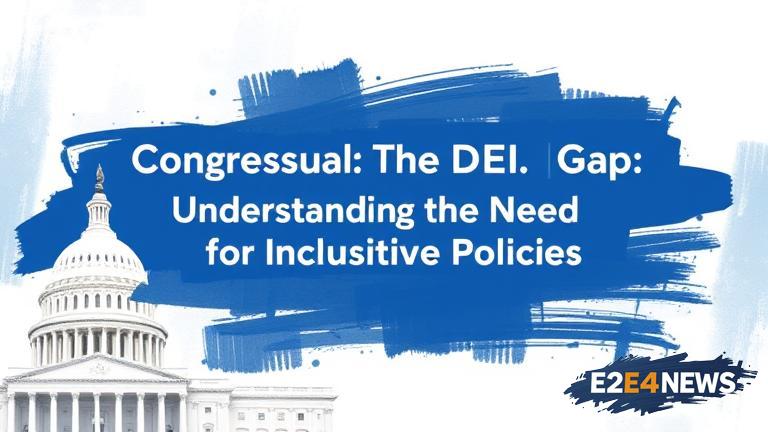The United States Congress has been facing criticism for its lack of diversity, equity, and inclusion (DEI) in its policies and decision-making processes. Experts argue that this knowledge gap is hindering the country’s progress towards a more inclusive and equitable society. DEI refers to the practices and policies that promote diversity, equity, and inclusion in all aspects of life, including education, employment, and healthcare. In the context of Congress, DEI is crucial for ensuring that the voices of all Americans are represented and heard. However, the current state of DEI in Congress is alarming, with many lawmakers lacking the necessary knowledge and understanding of these issues. This lack of knowledge is reflected in the policies and laws that are passed, which often perpetuate systemic inequalities and discrimination. For instance, the lack of diversity in congressional staff and the underrepresentation of marginalized communities in decision-making positions are major concerns. Furthermore, the absence of inclusive language and policies in congressional documents and laws is also a significant issue. Experts emphasize that Congress needs to prioritize DEI education and training for its members and staff to address these gaps. This includes providing resources and support for lawmakers to learn about the experiences and challenges faced by marginalized communities. Additionally, Congress should prioritize the hiring and retention of diverse staff, including people of color, women, and individuals from the LGBTQ+ community. By doing so, Congress can ensure that its policies and decisions are informed by a diverse range of perspectives and experiences. Moreover, Congress should also prioritize the development of inclusive policies and laws that address the systemic inequalities and discrimination faced by marginalized communities. This includes policies that promote equal access to education, employment, and healthcare, as well as laws that protect the rights of marginalized communities. Overall, the need for DEI knowledge and understanding in Congress is urgent, and experts argue that it is essential for creating a more just and equitable society. By prioritizing DEI, Congress can ensure that its policies and decisions reflect the diversity and complexity of the American people. The consequences of inaction will be severe, with continued systemic inequalities and discrimination perpetuating social and economic injustices. Therefore, it is imperative that Congress takes immediate action to address its DEI knowledge gap and prioritize inclusive policies and decision-making processes. The future of American society depends on it, and the time for action is now. Experts are calling on Congress to take a proactive approach to addressing DEI, rather than simply reacting to crises and controversies. By doing so, Congress can create a more inclusive and equitable society, where all Americans have the opportunity to thrive and reach their full potential.
